Futures Forum: The unconditional basic income
Futures Forum: The universal basic income
And it's an idea which is being embraced across the ideological spectrum - as this piece from the Economist earlier this month shows:
Universal basic incomes
Sighing for paradise to come
Arguments for a state stipend payable to all citizens are being heard more widely
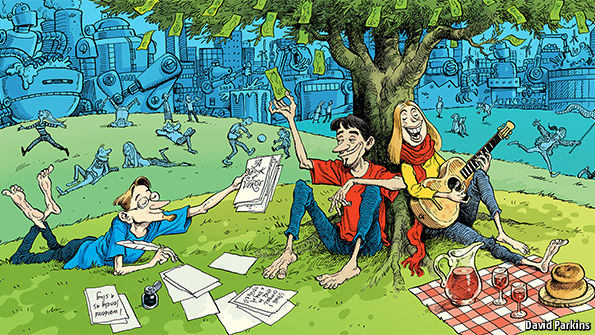
THE future is a paradise of technological abundance, some say, in which paid work is optional and no one goes without. A tiny glimpse at what that future might look like is on offer in the village of Maricá, a small seaside town just a short drive from Rio de Janeiro. In December 2015 each of the town’s 150,000 residents became eligible to receive a monthly payment worth just under $3, financed with the help of Maricá’s share of Rio state’s oil royalties.
The sum is small but for Washington Quaquá, the mayor of Maricá and architect of the payments plan, the idea is a big one. He says he is guided by “an ethical precept” that may realise his lifelong dream of an egalitarian society. His programme is an example of a “universal basic income”: a no-strings cash payment to everybody in a given jurisdiction.
The idea has a long pedigree, endorsed by great figures of the enlightenment such as the Marquis de Condorcet and Thomas Paine. Three centuries on, a handful of governments around the world, mostly in rich countries, are launching experimental basic-income programmes, or at least considering the idea. Finland will roll out a trial programme next year, in which some citizens will receive unconditional cash grants of up to €800 ($900) per month. Similar programmes are being mulled in several Dutch cities. On June 5th the Swiss will vote on a constitutional change to introduce a basic income for all citizens.
Political activists and thinkers across a broad array of ideologies, from libertarians to social liberals to the hard left, are intrigued, or even keen. The Cato Institute, an American think-tank which spends much of its time calling for a smaller state, published a sympathetic analysis of the policy in 2015. It feels that, though it might prefer a world with no government redistribution, a basic income is the simplest, least intrusive and least condescending way to provide redistribution if redistribution there must be.
American liberals including Paul Krugman, an economist and columnist, and Robert Reich, a former labour secretary, are also interested. Along with writers such as Anthony Atkinson, a British economist, and Andy Stern, an American union leader, they see a basic income (in some form) as a way of expanding the welfare state to reduce growing inequality (see chart 1). The idea also has some support in the further reaches of the left as, in the words of a paper published in 1986, “A capitalist road to communism”.
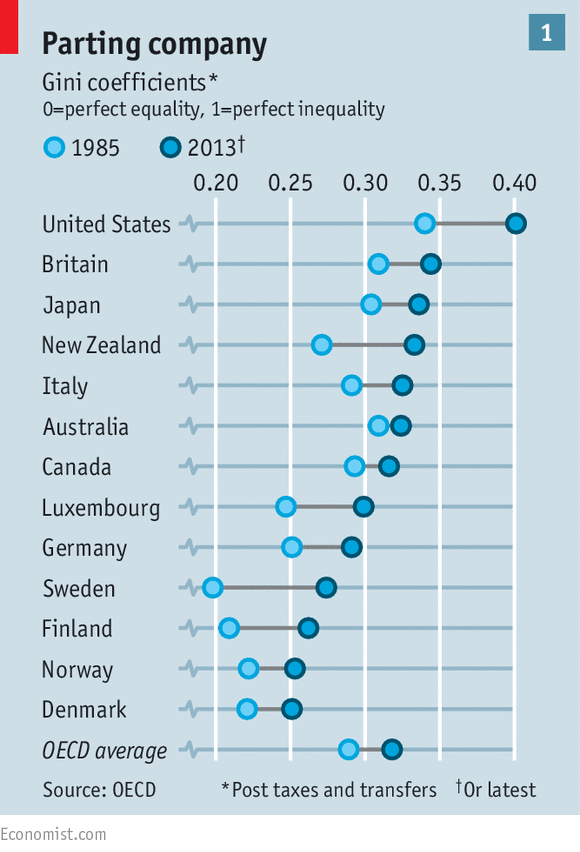
Unsurprisingly, given the Utopian and libertarian flavour of the idea, Silicon Valley is interested, too. This is not, though, simply faddishness. The idea of a universal basic income has long been tied up with worries about accelerating technological change. The basic income, or “social credit”, put forward in the 1920s by C.H. Douglas, a British polymath, was born of the worry that technology was opening up a gap between total output and the income earned by workers. He suggested that governments could make up the gap by issuing every citizen with a “national dividend”. (The first novel by Robert Heinlein, a canonical 20th-century science-fiction writer much rated in libertarian circles, consists largely of arguments in favour of social credit and nudism, both of which he saw as central to his Utopia.)
Some of the people behind today’s technological change see universal basic income in similar terms—a way of assuring a living for all in a world of robots and artificial intelligence. To the extent that such disruption is part of their business model, this beneficence is also a way to neutralise complaints about the havoc their innovations may wreak. Albert Wenger, a partner at Union Square Ventures, a technology-oriented venture-capital firm, argues in favour of the policy in a new book “World After Capital”. Sam Altman, the founder of Y Combinator, a startup incubator, plans to pilot a basic income of $1,000-2,000 a month in Oakland, a city in California. “Fifty years from now...it will seem ridiculous that we used fear of not being able to eat as a way to motivate people,” is how Mr Altman puts it.
Startup statists
Backers make other arguments, too. Workers could take more time to train and explore different careers. The security of a basic income could boost enterprise, because leaving a job and using up savings to open a business are more palatable prospects in such a world. So is finding fulfilment in unremunerated ways.
A basic income could also help to right certain old injustices. Women do the lion’s share of the world’s unpaid labour. In most of the world, they work more hours a day than men do, but command a lower share of financial resources, largely because they take on more unpaid child care and responsibilities for the family home. A universal basic income would shift purchasing power toward people who do work which, though valuable to society, is not rewarded financially.
As well as offering the possibility of a simpler and perhaps fairer welfare state, supporters of a universal basic income say it answers fears that paid work will break down as a mechanism for distributing purchasing power. In recent years, across many rich economies, the wages earned by the typical worker have grown pitifully slowly—and by less than GDP per person (see chart 2).
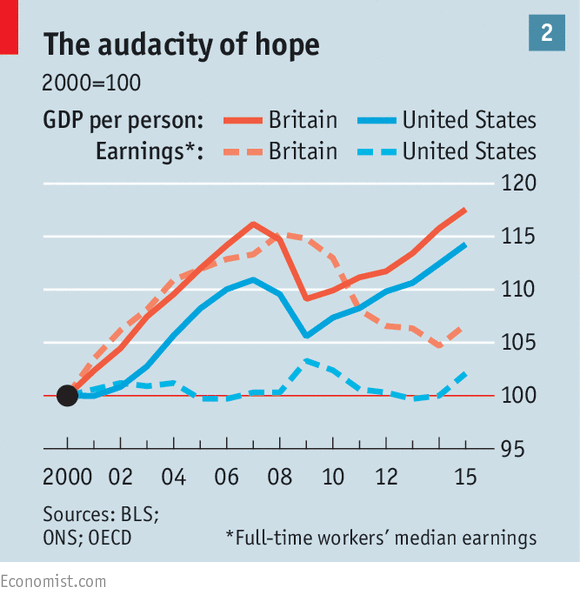
Low wages appear to be necessary to coax firms into taking on new employees, often in very low-productivity jobs that could potentially be done by machines instead. This could be a temporary phenomenon; the workers at the bottom of the income scale may eventually shift into better-paid work, or future generations may cleverly invent new sources of employment for themselves. If it is a permanent state of affairs, though, then a basic income might be a way of making sure that everyone shares in society’s progress, at least to some extent.
But how such a step might be made to work, and what harmful effects it might have, are still open questions. The Swiss government, which is arguing for a “no” vote in this month’s referendum, worries that a basic income would be ruinously expensive and morally corrosive, leaving the country with unsustainable public finances and a society of unmotivated loafers. Both supporters and critics agree that universal basic incomes would challenge the centrality of paid work to the way people live. A world with them in place could be as different from today’s as that of public education and guaranteed pensions was in the 1950s, compared with a century before, when the loss of a job could mean starvation for a worker and his family.
Welfare review
The reforms introduced by Otto von Bismarck, the German chancellor who created the world’s first modern welfare state, were intended to undermine support for socialism and build working-class backing for the German empire. The system he put in place was conceived as an insurance against the woes of hardship, rather than as a natural entitlement. Over the following century, as trade unions sought a better deal for labourers, work was a central principle of organisation. Those reforms created the developed countries’ modern welfare systems: some sort of unemployment benefit, health-care provision, universal education and state pensions.
Universal-income ideas such as those championed by Douglas were for the most part peripheral during the rise of the welfare state. In the 1970s, in part because of flaws that were becoming apparent in the existing structures, they briefly interested mainstream policymakers. They were experimented with in Canada, where Douglas’s ideas had always had a following. In Alaska a basic income was discussed as a way to distribute oil riches. George McGovern, the Democratic candidate in the 1972 American election, proposed a “demogrant” of $1,000 ($5,700 at today’s prices) to every citizen, a policy drawn up by James Tobin, an economist.
McGovern lost 49 of the 50 states, but a reform to the welfare state that was similar, in some ways, still went ahead. In 1975 Congress created the Earned Income Tax Credit (EITC). It was a sort of “negative income tax”, an idea promulgated by the economist Milton Friedman, which provided support in inverse proportion to a worker’s income. Like Tobin’s demogrant, Friedman’s idea was in part a response to worries about the “poverty trap” in existing welfare systems. The way that benefit programmes cut off at particular income thresholds provided a strong incentive for recipients not to earn too much.
The demogrant avoided the trap by not phasing out benefits as incomes rose. The EITC lessened it by tapering away only gradually. For the unemployed, this increased incentives to work by amplifying the income earned by the lowest-paid. Two things made the second policy much easier to sell: it was cheaper, and it was only available to those in work. Britain, France and others adopted EITC-like working-tax credits in the 1990s and 2000s. Wage subsidies were increasingly seen as important for battling poverty.
Today three decades of unequal economic growth, the pain that followed the financial crisis in 2008 and the disruptive potential of digital technologies have once again focused attention on the welfare of the struggling working class. One response, in much of the developed world, has been to raise minimum wages. But economists warn that minimum pay can only rise so much before employment suffers. Rising labour costs encourage firms to look for labour-saving alternatives, an investment in productivity which might be good for GDP but would exacerbate the shortage of jobs for less-skilled workers.
Populist politicians argue, wrongly if seductively, that the key to boosting worker welfare is to undo the liberalising measures of the previous generation. Supporters of a universal basic income, on the other hand, claim that the re-engineering of the welfare system they envisage could allow societies to enjoy the fruits of dynamic economies while also ensuring they are widely spread.
Their argument runs as follows. The wage-subsidy approach to welfare has gained ground because it has real effects on poverty, it maintains incentives to work and it doesn’t cost all that much. America’s spending on its EITC programme, for example, is just 8% of its spending on public pensions. But it has three problems, too. Though such subsidies reduce the poverty-trap effect, they do not eliminate it; generous wage subsidies that phase out as incomes rise reduce the incentive to find better-paying work, because some of the gain received from a raise is offset by a reduction in benefits. A gently sloping phase-out answers the problem to some extent, but it also increases costs, with more of the workforce qualifying for at least some of the benefit.
Those cost increases highlight a second concern, of political economy. The targeting which keeps these programmes cheap also limits their constituencies. That makes them cuttable. In recent years austerity-minded governments have been more willing to gut means-tested welfare payments than to take an axe to entitlements such as universal pensions. It is harder to build broad support for programmes which, by design, are aimed at a small underprivileged part of the citizenry. Programmes for the poor, who have little to spend on lobbying and also tend to vote less, are vulnerable to being chopped.
Perhaps most importantly, such tax-credit policies begin to break down if there is no prospect of jobs that make use of people’s skills. When manufacturing jobs that were the keystone to a regional economy move abroad, for example, people with few prospects look for alternative means of support, such as disability benefits. In most age groups in Britain the share of population claiming disability benefits is systematically and substantially above the level of the 1980s, despite efforts to control growth in disability-benefit costs. Since 1988, America’s disability payments have risen from one in ten of every social-security dollar spent to one in five. Those unable to find work or get on such programmes sink deeper into poverty. In America many are slipping through the cracks of a conditional welfare system: the number of people living in extreme poverty rose sharply between 1996 and 2011, from 636,000 to 1.5m, according to Luke Shaefer of the University of Michigan and Kathryn Edin of Harvard University.
A universal basic income might solve these problems. As Tobin argued, a flat basic-income payment eliminates the poverty trap. Since the benefit would not phase out, there would be no reduced incentive to seek additional work hours or income. Because it would be paid to all citizens, its advocates hope that it would enjoy the political support of an entitlement programme, and come to be seen as a right of citizenship. And it would clearly benefit people with no prospect of work, and thus most of those in extreme poverty.
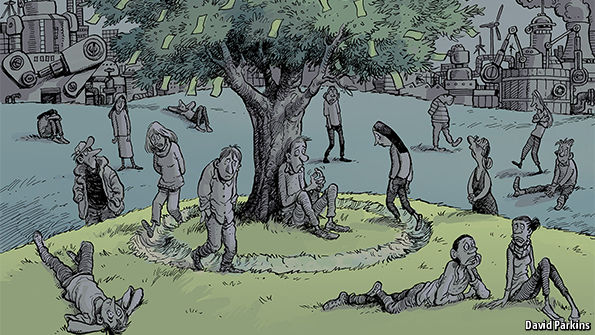
But that still leaves very hard questions, of which the toughest is cost. Any universal basic income generous enough to make a dent in poverty would be very expensive. As Mr Atkinson notes, a universal basic income worth a given percentage of the average income (measured as GDP per person) requires a proportional rise in tax collection as a share of GDP. In other words, a basic income of 15% of average income would require tax revenues of 15% of national income dedicated to it. That is a lot of tax for not much basic income (only about $8,000 in America, in this example).
Some of the money needed could be drawn from other welfare programmes displaced by the basic income. The most generous states in the OECD, a club of mostly rich countries, spend nearly a third of GDP on social programmes. In Finland, where such spending, less the share devoted to health, accounts for about a quarter of GDP, dividing what is spent across all citizens would yield a payment of close to $10,000 for every man, woman and child; in America the same exercise would yield a payment per person of about $6,000 (see chart 3).
This would transfer a lot of money from today’s welfare recipients to people already in work. The largest group of losers would be old-age pensioners, the people who, in most countries, already enjoy a basic income (one that in America costs more than ten times as much as EITC does).
It is possible that providing a less generous basic income to all could help sever the link between receipt of a pension and retirement, encouraging more of a balance between work and leisure for adults of all ages. It might also help the governments of countries with ageing populations manage demographic change, by encouraging older workers to stay working for longer, and by balancing the fiscal burden of government income support across people’s lives. But politically, the scope for reductions in pensions is likely to be slim. It is hard to see how a universal basic income of even moderate ambition would not require new forms and levels of taxation.
As a share of GDP, taxes on income and profits in the OECD range from about 12% in America and Britain to 33% of GDP in Denmark. The share has fallen as often as it has risen over the past decade or two. It is plausible that the tax take, especially in the countries with the lowest share, could go up without many adverse effects. If America is unlikely to become Denmark, it might nevertheless become Australia, with a 15% share of GDP taken in such taxes. That would represent half a trillion extra dollars a year.
Raising taxes on income and profits has its risks, though. It increases incentives for avoidance and evasion, and reduces the incentives for the most productive workers to work and for companies to invest. An alternative would be to increase income through more efficient taxes, such as value-added tax (VAT). Most European countries raise at least 10% of GDP through taxes on goods and services, primarily VAT. America, in contrast, raises only 4.5% through taxes on goods and services, none of which is collected in VAT form. But although a VAT is efficient, it is also regressive, hitting poorer people relatively harder.
In some places payments for natural resources could provide some funding. Oil revenue pays for most of the Maricá scheme, and allows Alaska’s Permanent Fund to pay an annual dividend to each of the state’s citizens (last year’s was $2,072). Not every state has a commodity that it can tax that way; but every single state has perhaps the lowest-hanging of all taxable fruit—land.
A land tax has the advantage of being progressive. Unlike taxes on income, land taxes do nothing to encourage apathy or avoidance; rather, they provide an incentive to owners to get the most out of their property. And they can also be lucrative. The sum value of all land in America, according to one recent estimate, is about $23 trillion, or 1.6 times GDP. A land-value tax of 5% would raise a little over $1 trillion, which works out at about $3,500 for every American, or $8,500 for every American household.
Thomas Paine would have relished such a prospect. His case for a basic income justified it as a quid pro quo for the existence of private property. Before the advent of private property, he believed, all men had been able to support themselves through hunting and forage. When that resort is taken from them, they should be compensated by means of a “natural inheritance” of £15 to be paid to all men every year, financed from a “ground rent” charged to property owners.
What might have seemed like common sense to Paine, though, might not be so immediately appealing to those hit by a trillion-dollar land-tax bill. Acceptable levels of taxation do change over time. The original growth of the welfare state provides an illuminating example. At the turn of the 20th century, government spending was about 15% of GDP in Britain and less than 10% of GDP in America. By 1960, those percentages had risen to nearly 35% in Britain and 30% in America.
But the fact that such an increase has been carried off once does not mean it can be again. Today’s combination of stagnant pay and falling labour-force participation is serious, but it is not on a par with, say, the Depression or the world wars that bracketed it, which drove the expansion of the state’s role in the economy (see chart 4). Things will need to become a lot worse to generate political support for the radical changes to budgets and tax systems a universal basic income requires.
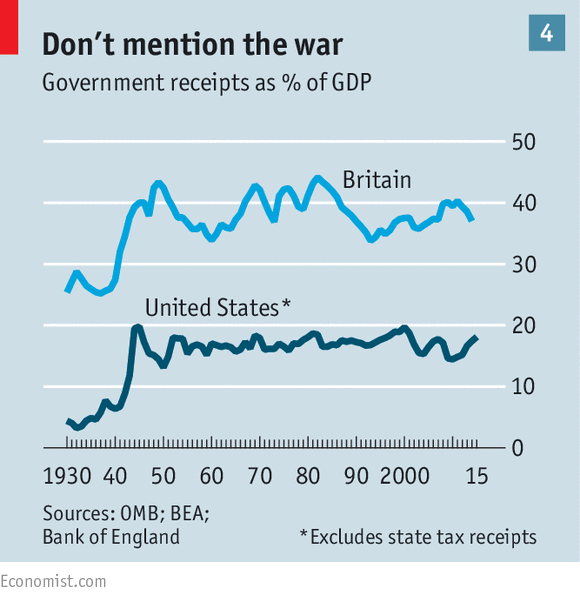
And what do you do?
Cost is not the only concern about a universal basic income. Many worry that a general disengagement from work might prove alienating, and money for nothing socially corrosive. (Some on the left also fear that, by weakening the power of labour and the sense of solidarity that comes with it, a basic income would lead to the political and economic irrelevance of the working class.)
People rely on work to provide order to their day and purpose to their lives, not just for money to pay for food and shelter, and may not find purposeful, satisfying alternatives in its absence. Analysis of time use by Americans who suffered a loss of work during the recent recession found that about half of the spare time went to leisure, mostly sleeping and watching television. In general retirees who continue to work part-time are happier than those who do not work, though it is worth noting that this is not the case for those who feel forced to keep working to make ends meet.
In experiments with a guaranteed income in Manitoba, a Canadian province, in the 1970s overall labour-market participation did not change very much. Later analysis has suggested that there were widespread non-economic benefits—less use of mental-health services, fewer hospital visits and so on. But such experiments, limited in space and duration and subject to what is known as the “Hawthorne effect”—change that comes about simply because people know there is an intervention afoot—may not be good guides to the effects of a universal system.
Plenty also fret that a world of universal incomes would mean even higher hurdles to migration than today’s. The evidence that benefits are a draw to immigrants is thin—they care more about jobs than the generosity of the welfare system. But if rich countries began offering basic incomes generous enough to live on, migrants might instead be drawn by the money on offer. (The payments being considered in Finland and the Netherlands are vastly larger than the tiny income available in Maricá, for example.) Rich countries would face the choice of paying generous benefits to immigrants, shutting borders, or tolerating the growth of a second-class citizenry of foreign workers without recourse to the welfare state.
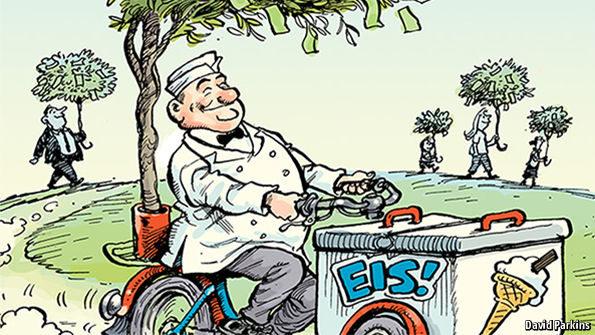
These, then, are the questions swirling around Switzerland ahead of its referendum. The Swiss initiative does not look likely to pass, both because of its expense and the fear of subsidising layabouts. Though surveys show that only 2% of the Swiss think that a universal income would stop them working themselves, about a third think it would scupper the work ethic of others.
Payment protection
Hans Peter Rubi, a 64-year-old in the small town of Olten, has no such worries. He was given a pension of SFr2,600 on being sent into early retirement, and became an entrepreneur. “After doing nothing, you get bored—people want more. After a while of boredom you might become innovative.” He has used his pension to start an exotic ice-cream parlour. The avocado ice cream is proving difficult to perfect, and the innovation of staying open through the winter (Olten’s established ice-creamery closes) has yet to pay off. He needs a good summer for the business to be profitable; but he can afford to fail. “My security now is that I have my basic income. It gives a security to take a basic challenge.”
In a world of universal basic incomes, it is possible that the streets would be lined with mostly empty ice-cream shops, as people used society’s largesse on projects no one really needs. It is also possible that such stipends would give workers the boost in incomes they have been missing in recent decades, and the additional leisure time to enjoy it, thus helping to make businesses like Mr Rubi’s profitable.
It may be, too, that the need for a universal basic income never becomes truly urgent. Silicon Valley visionaries could be wrong in their belief that a thriving 21st-century economy will be one where jobs go to robots faster than new jobs can be created, and that a universal income is the way to make that transition humane. The capitalist system has been remarkably good at finding new ways to work as it gets rid of old ones.
But the past is not always a good guide to the future. The welfare system grew up to service a model of industrial modernity. It is failing the poorest in society and may be at risk from technological upheaval. It may yet need a radical redesign.
Sighing for paradise to come | The Economist
.
.
.

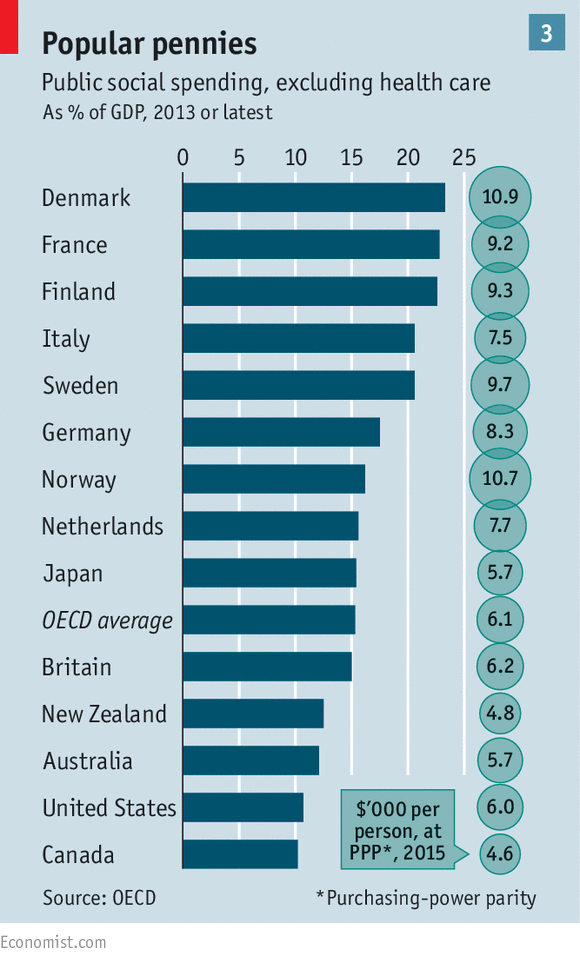
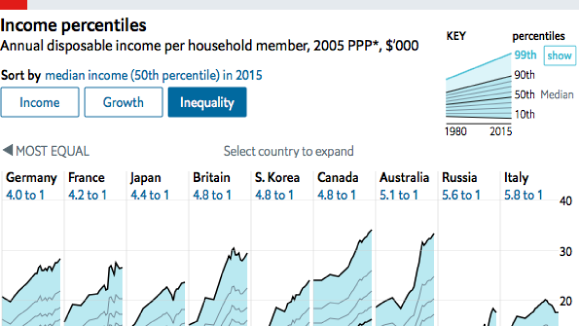
No comments:
Post a Comment